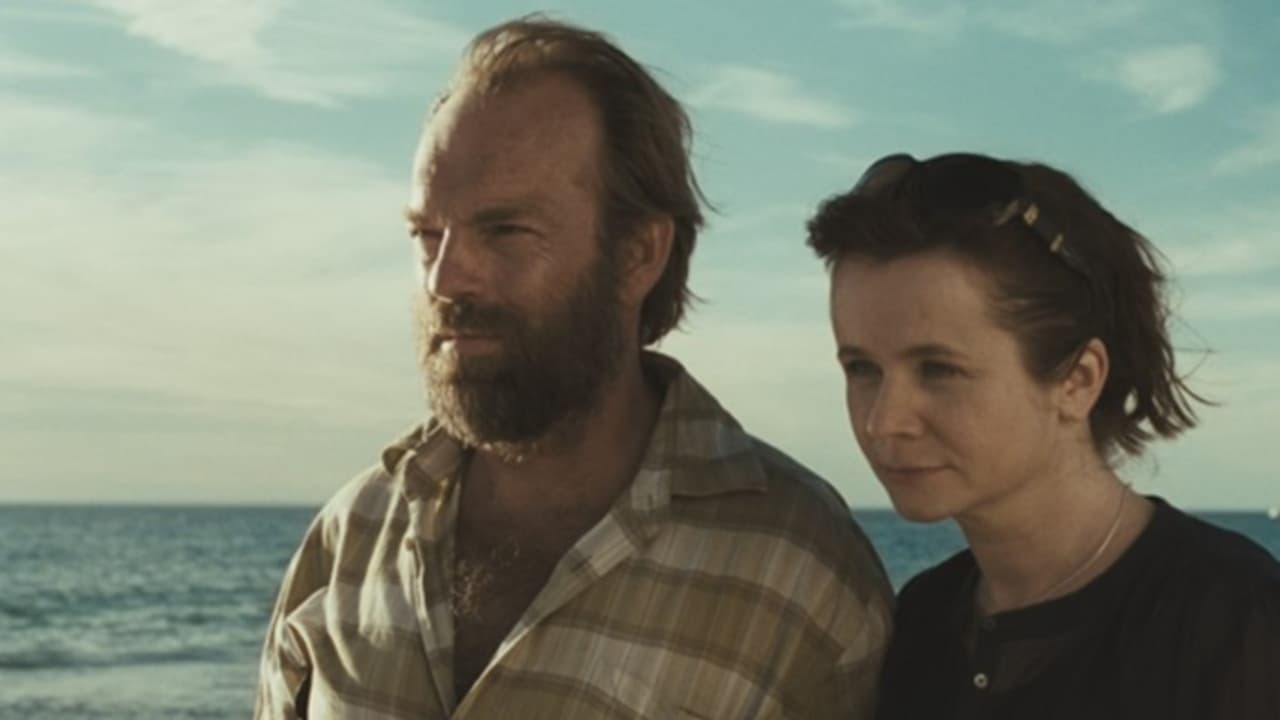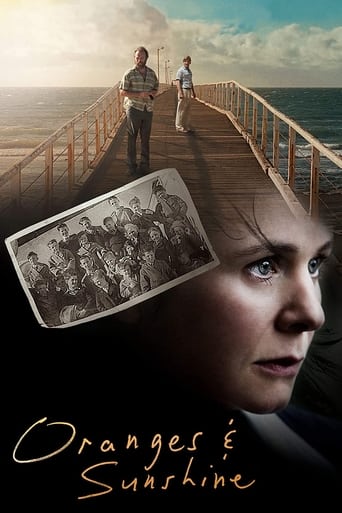

Oranges and Sunshine (film) & Anne Hamilton-Byrne (Messiah) ...a correlation ???There appears to me ...a correlation with the events in this film and the cult of & Anne Hamilton-Byrne. Anne Hamilton-Byrne She (Anne) gathered young boys and girls and raised them as her own on a property in Lake Eildon in central Victoria. Some children were obtained through questionable adoptions, others were born to cult members and some were even handed over by compliant sect parents. The identically dressed children, with bleached blonde hair shaped into the same bob, were allegedly bashed, starved and injected with LSD by Hamilton-Byrne and other cult leaders in terrifying sect initiation rituals. Oranges and Sunshine Set in 1980s Nottingham, social worker Margaret Humphreys holds the British government accountable for child migration schemes and reunites the children involved -- now adults living mostly in Australia -- with their parents in Britain.
... View MoreMaking an "historical" film is a fine balance. Much of history, even important history, can be exceedingly boring. How then, can a movie, whose sole raison d'etre is to make money via entertainment, possibly achieve this end without a substantial dollop of poetic license? And at what point does the ratio of fiction to fact destroy a film's credibility? Is it morally justifiable to get the 10% of history across by sugar coating it with 90% of saccharine? At what point should the moral responsibility of a director decide that he should make a documentary rather than a "drama"? More power to people like (the real) Margaret Humphreys, the protagonist of this film. The world surely needs more like her. But I can't help but think that a person who has done what she has done would not cringe at the portrayal of her in this film. This movie tries to tackle a number of issues related to the general topic of British children being sent overseas to a new and hopefully better life. First there is the standard and thorny topic of whether children should be taken from their mothers (fathers do not get a solitary mention here), and if so under what circumstances. Modern day viewers, in our supposedly enlightened age are supposed to settle our overfed bodies into a soft lounge suite, gaze into our 60 inch televisions and pass enraged and morally superior judgments on decisions made 70 years ago, in a zeitgeist we will never understand, when even a "wealthy" and "civilised" nation like Great Britain was for most people a hell hole of poverty, great depressions and world wars. Then there is the issue of what appears to be the mismanagement on the part of (in this case) the Australian authorities in placing these children. This issue, key to the understanding of the whole process, is scarcely mentioned. Thirdly, the specific issue of abuse suffered at the hands of Catholic priests. It is this last issue that comes in for the biggest hammering and which considerably blurs the focus of the movie. All of the horror stories we hear are from men, and most of these are related to abuse by Catholic priests. We are bound to wonder if the movie is a comment about sending children overseas or about the generic issue of the sexual persuasions of Catholic priests, anywhere or at any time. Or are we supposed to link these generic Catholic abuse issues to what (I gather) is supposed to be the primary "subject" of the movie, forced deportation of children from the UK, thereby making that issue seem worse? It is difficult to be convinced about the veracity of a movie that has an Australian woman, out of all places in England, randomly turn up at Margaret Humphrey's encounter group. Or that that person should hand over to a complete stranger all the documentation that this movie goes to great lengths to show us is so difficult to find. Or that any normal person in Britain, at a time when overseas travel was a once in a lifetime experience, could find the money to up and fly away to Australia. Or that superiors in a government agency that is so cash strapped it sends its children overseas are so benevolent that they can offer Margaret 2 years leave and funding to pursue her research. Or that everyone in the world, including a young man in the Australian Embassy and a woman in her encounter group, know about this when Margaret and her employers, who are in the business of the disposition of children, know nothing. And what is with the whole "Len Connelly behaving like a obnoxious dork" act when we meet him, but being perfectly normal in subsequent scenes, all about? And can we really believe that a person so badly abused by Catholic priests would donate considerable amounts of money to them? What was that whole visit to Bindoon, with its ridiculous and totally unbelievable "tea" scene, all about? And the nadir of Margaret flying off the handle in the totally contrived "Ave Maria" scene? The equally nauseating and unrealistic "I gave you Mummy for Christmas" scene? For Pete's sake, never give children lines that could only come from philosophers. We meet many people, but never long enough to care about any of them. We don't really connect with Len, Nicky, her brother, Charlotte, Vera, or the many other bit players that turn up. For all her angst Margaret herself is not portrayed as a particularly warm character, and we have to deal with the hypocrisy of her (apparently) being guilty of the same sins as those she rails against – not caring enough for her own children. The movie is, I think well intentioned and it is a subject we should all be aware of. For all that, I would have been far more interested in tracing a specific child's passage from a child in poverty stricken England to adulthood, with or without Margaret Humphrey's presence. This at least would have given a complete picture and provided a much needed focus.
... View MoreA technically well made film of a deeply shameful episode in the history of UK government, social workers and charities, most of whom have yet to learn the necessity of transparency or accountability. But the central character of Margaret is portrayed as a self satisfied, self righteous prig. Was she really like this? When accused by a female receptionist of lying, she states categorically "I do not tell lies, ever." Really? She is the only human being in history to achieve this feat.It was exactly that arrogant, delusional attitude which helped lead to the problem this film shows, and it's still appallingly common amongst the so-called professionals in the social work and policing fields. (A recent example in the UK was the widespread ignoring of teenage girls who got caught up in sex rings.) Margaret never displays inappropriate feelings and acts entirely in accordance with 21st century mores - not those of the 1980s. Ultimately, this is a Disneyfied version of what must have been a much more problematic and complex story. It feels nothing like reality.For example: the meeting at the Christian Brothers' house is presented with The Great Saint Margaret sitting on high in judgement over the inferior beings who are just trying to eat a simple meal. We are not told which, if any, of those men committed any of the heinous crimes against children many years previously. This is dreadful film making and very dishonest. I cannot believe that this woman could have been so self-denying - it would have made her unbearable to live with.
... View MoreOranges and Sunshine – CATCH IT (B+) The film tells the story of Margaret Humphreys, a social worker from Nottingham who uncovered the scandal of "home children", a scheme of forcibly relocating poor children from the UK to Australia and Canada. Margaret reunites estranged families and brings worldwide attention to the cause. Deported children were promised oranges and sunshine but they got hard labor and life of misery and sexual abuse in institutions such as Keaney College in Bindoon, Western Australia. (Wiki) Oranges and Sunshine is a sensitive subject matter which defiantly put Britain in Shame when Margaret Humphreys broke out the story in 80s. Emily Watson's portrayal of Margaret Humphreys' trouble to help the transported kids all the way to Australia is heart wrenching. The emotional turmoil she goes to work for them while managing her family is something really inspiring. Emily Watson is a great actress and no doubt she brings her emotional range to the real life role model. In supporting cast Hugo Weaving & David Wenhem did a fine job. Overall, it's a sensitive movie about a sensitive issue. Keep in mind its tear jerker, so keep a box of tissue.
... View More